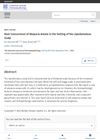 20 citations,
January 2013 in “Evidence-based complementary and alternative medicine”
20 citations,
January 2013 in “Evidence-based complementary and alternative medicine” TGPC plus CGT is effective and safe for treating severe alopecia areata in children.
18 citations,
August 2012 in “Chinese journal of integrative medicine/Chinese Journal of Integrative Medicine” Both treatments for alopecia areata are equally effective and safe.
 11 citations,
November 2022 in “JAMA dermatology”
11 citations,
November 2022 in “JAMA dermatology” Some nutritional supplements may help treat hair loss with generally mild side effects.
[object Object] Gushen Shengfa pills and Wuling capsules are more effective for hair growth and sleep quality than the control treatment.
 February 2022 in “Chinese Journal of Dermatology”
February 2022 in “Chinese Journal of Dermatology” A 36-year-old woman with worsening hair loss over 10 years was treated with various medications, and after six months, her hair loss did not worsen significantly.
 September 2022 in “The American journal of dermatopathology/American journal of dermatopathology”
September 2022 in “The American journal of dermatopathology/American journal of dermatopathology” A patient with a thick scalp and hair loss was correctly diagnosed with alopecia areata and a thick scalp fat layer, not lipedematous alopecia, and regrew hair after treatment.
 January 2015 in “Hair therapy & transplantation”
January 2015 in “Hair therapy & transplantation” Some botanical products may help increase hair growth in people with alopecia, but more research is needed.
 1 citations,
April 2019 in “Journal of Investigative Dermatology”
1 citations,
April 2019 in “Journal of Investigative Dermatology” Dupilumab is effective and safe for treating moderate-to-severe atopic dermatitis in adolescents.
 1 citations,
April 2019 in “Journal of Investigative Dermatology”
1 citations,
April 2019 in “Journal of Investigative Dermatology” VB1953 gel significantly reduced acne and resistant bacteria in patients who didn't respond to clindamycin.
 April 2019 in “Journal of Investigative Dermatology”
April 2019 in “Journal of Investigative Dermatology” Many patients with autoimmune blistering skin disorders change their diets, avoiding foods like alcohol, citrus, and spices, and some find vegetables and dairy helpful.
 April 2019 in “Journal of Investigative Dermatology”
April 2019 in “Journal of Investigative Dermatology” Sandalore®, a synthetic scent, improved hair loss and satisfaction in women with telogen effluvium.
 33 citations,
January 2010 in “International journal of trichology”
33 citations,
January 2010 in “International journal of trichology” Antimicrobial therapy can help manage Folliculitis Decalvans.
 72 citations,
July 2014 in “American journal of clinical dermatology”
72 citations,
July 2014 in “American journal of clinical dermatology” Some treatments, like corticosteroids and sensitizing agents, can help with alopecia areata, but more high-quality research is needed.
 41 citations,
September 2018 in “Australasian journal of dermatology”
41 citations,
September 2018 in “Australasian journal of dermatology” No systemic treatment for alopecia areata has strong evidence of effectiveness.
 14 citations,
June 2019 in “BMC infectious diseases”
14 citations,
June 2019 in “BMC infectious diseases” A rare fungal infection on a child's scalp was successfully treated with antifungal medication.
 3 citations,
August 2021 in “Cutis”
3 citations,
August 2021 in “Cutis” Some alternative medicine treatments might work for skin conditions, but their effectiveness and safety differ a lot.
 December 2024 in “Cureus”
December 2024 in “Cureus” Baricitinib treatment for alopecia universalis can cause hair regrowth with unexpected whitening.
 April 2024 in “International journal of women's health”
April 2024 in “International journal of women's health” Adult female acne is a complex condition that can worsen with menopause, requiring holistic treatment and tailored skincare at different life stages.
 April 2024 in “Journal of asthma and allergy”
April 2024 in “Journal of asthma and allergy” Abrocitinib effectively treated severe atopic dermatitis and mild alopecia areata in a 12-year-old boy after dupilumab failed.
 April 2023 in “Tikrit journal of pharmaceutical sciences”
April 2023 in “Tikrit journal of pharmaceutical sciences” Ginger extract helps hair growth and reduces the need for prednisolone in alopecia areata patients.

Better models and evaluation methods for alopecia areata are needed.
40 citations,
August 2018 in “Journal of the American Academy of Dermatology” Clindamycin and rifampicin are the most effective treatments for folliculitis decalvans, but more research is needed.
23 citations,
February 2021 in “Dermatologic therapy” Some treatments like pentoxifylline with topical corticosteroids might work for alopecia areata, but more research is needed to find the best one.
 4 citations,
March 2023 in “Current Oncology”
4 citations,
March 2023 in “Current Oncology” Scalp cooling is the only FDA-approved method to prevent hair loss from chemotherapy, but other treatments like minoxidil and PRP are being tested.
 3 citations,
May 2021 in “Evidence-based Complementary and Alternative Medicine”
3 citations,
May 2021 in “Evidence-based Complementary and Alternative Medicine” Some traditional Chinese medicines may have anti-aging benefits and could help with hair growth, but more research is needed.
2 citations,
May 2023 in “Frontiers in Pharmacology” Natural products may help treat skin inflammation from abnormal adrenal hormones.
1 citations,
July 2021 in “Clinical Cosmetic and Investigational Dermatology” Syphilis should be considered if PLEVA-like symptoms don't improve with treatment.
 January 2025 in “Frontiers in Genetics”
January 2025 in “Frontiers in Genetics” Combining minoxidil and plant extracts improved hair growth in a boy with a rare genetic disorder.
 August 2024 in “Archives of Dermatological Research”
August 2024 in “Archives of Dermatological Research” Combining botulinum toxin type A with Minoxidil significantly improves hair growth and patient satisfaction in male hair loss.
[object Object]  July 2024 in “Journal of Dermatological Treatment”
July 2024 in “Journal of Dermatological Treatment” Botanical extracts and Minoxidil improved hair condition in a boy with a genetic disorder.























